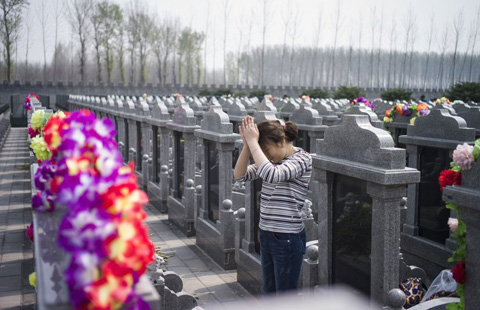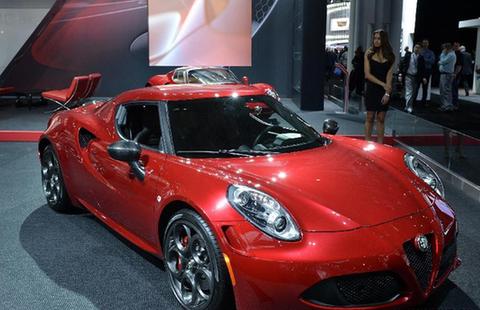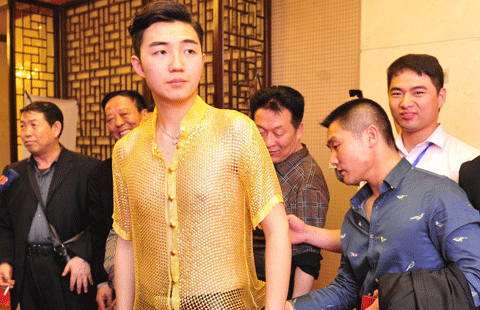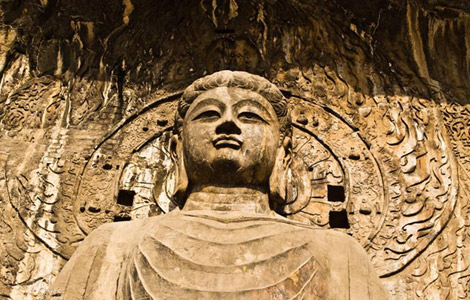Chinese attractions slash entrance fees to bring in tourists
Updated: 2015-04-06 13:38
(Xinhua)
|
||||||||
NANCHANG, April 5 (Xinhua) -- The Lushan Conference Hall, where Mao Zedong convened a historic meeting in 1959, exemplifies one of the late communist leader's theories: whoever wins the people wins the war.
The site at scenic Lushan Mountain, Jiangxi Province, has just reversed the tide in its battle for visitors. Last year, it received 400 tourists a day, but after it scrapped entrance fees in March, the number jumped to 3,000.
"I've worked here for over 20 years but I've never seen such a crowd," said one member of management staff, Huang Ying. The influx of tourists even prompted management to build a wooden corridor to shelter the long queues, she said.
As the three-day holiday surrounding China's Tomb Sweeping Day, which falls on Sunday this year, brings a minor travel surge, Chinese scenic spots like the Lushan Conference Hall are making tough changes to appeal to tourists.
The historic building axed its entrance fee to address the problem of dwindling visitors as tourists complained they had to pay an extra 50 yuan (8 U.S. dollars) to tour the conference hall in addition to buying an 180-yuan entrance ticket for the mountain, said Ye Shifeng, vice head of the site's management bureau.
The decision came after China's tourism administration called for entrance fee reforms in January. Jiangxi was among seven provinces and municipalities to pilot the reform.
Worrying signs in the tourist market are pushing the change. Statistics from the China National Tourism Administration show that overseas visitors to China last year decreased by 1 percent, while overseas travel by Chinese tourists hit a new high with a 19.5-percent increase in the number of outbound travelers.
Jean-Paul Godelet from Belgium, who has toured more than 20 Chinese cities, said China is losing its appeal as an inexpensive tourist destination. With the devaluation of the euro against the RMB, some Chinese destinations have caught up with Europe in terms of travel costs.
"But the rising costs have not brought better services," he said. "In many places, I can't see French signs or get French-speaking tour guides."
The same problems are also luring Chinese vacationers abroad, and the debut of more bargain flights and hotel services targeting Chinese tourists is helping the trend. Some package tours to Thailand and Cambodia boast prices lower than those to China's Yunnan and Hainan.
A big part of the mounting travel expenses comes from entrance tickets. According to the Chinese Academy of Social Sciences, entrance fees accounted for 27 percent of total travel spending in Beijing and Shanghai in 2014, and in county-level cities, the percentage stood at a whopping 51 percent.
Reforms require swallowing bitter pills. Entrance fees at scenic spots are a major revenue source in many cities, which explains local governments' defensive stance on high ticket prices despite strong public opposition.
Lushan Mountain, however, has embraced the business logic of slashing entrance fees as it brings in tourists who are willing to spend on other services. The local government is now developing an array of souvenirs to get tourists to open their wallets, according to Ye.
Huang knows she has to adapt to the new way of life. She ended 20 years of service as a ticket seller and now works to maintain order and control the crowds as the conference hall welcomes more visitors.
"It's a challenging new job, but everyone needs to adapt to survive," she said.
- HK commemorates 25th anniversary of Basic Law
- Chinese city removes family consent provision for body donation
- Solar Impulse 2 Pilot appeals for clean future
- Chinese vice premier meets Thai princess
- Northeast Chinese government fined for destroying family tombs
- China live broadcasts pandas' failed natural mating

 Former president Fidel Castro appears in public in Cuba
Former president Fidel Castro appears in public in Cuba
 Now and then: Changing funeral trends
Now and then: Changing funeral trends
 Chinese honor war heroes on Tomb Sweeping Day
Chinese honor war heroes on Tomb Sweeping Day
 Lunar eclipse turns the moon 'blood red'
Lunar eclipse turns the moon 'blood red'
 2015 New York International Automobile Show kicks off
2015 New York International Automobile Show kicks off
 Ancient 'Xiangshi' kicks off in Wuzhen
Ancient 'Xiangshi' kicks off in Wuzhen
 Golden moments at jewelry show
Golden moments at jewelry show
 Luoyang, the ancient capital of thirteen dynasties
Luoyang, the ancient capital of thirteen dynasties
Most Viewed
Editor's Picks

|

|

|

|

|

|
Today's Top News
China promotes eco-friendly burials
US benefits from high-level engagements with China: Lew
China to develop city clusters along middle reaches of Yangtze
HK commemorates 25th anniversary of Basic Law
Family consent not needed to donate corpse for research in Guangzhou
Xi plants roots of
green awareness
Li backs firms' global vision
China to standardize energy conservation by 2020
US Weekly

|

|







